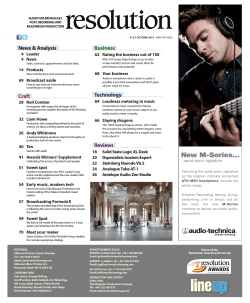
Audio inpainting - Estimation of missing audio data
Audio inpainting - Estimation of missing audio data Two-year postdoc research position Laboratoire d’Informatique Fondamentale de Marseille (Lif), France Contact: Valentin Emiya, firstname.lastname@lif.univ-mrs.fr This research position is funded by the French National Research Agency (ANR). Keywords: machine learning, signal processing, inpainting, audio, time-frequency. Scientific context. An increasing interest is being observed for audio inpainting1 , i.e., problems where portions in audio data are partially missing or highly degraded and must be estimated from the complementary, reliable data, referring to similar problems in image processing. Instances of such problems are click removal, CD scratches removal, declipping, packet loss concealment, source reconstruction in the time-frequency domain and bandwidth extension. The audio inpainting unified formulation as an inverse problem is a promising abstraction to factorize the main difficulties shared among tasks, to provide methods that outperform state-of-the-art techniques and to address new problems where missing data reconstruction has been too difficult to be addressed so far. The recruted postdoc researcher will be in charge of developing further the audio inpainting concept as well as new methods to address audio inpainting tasks, in a signal processing and machine learning perspective. Objectives. Now that the audio inpainting concept has been defined and validated with basic approaches, a large avenue of research directions is open in order to • define and address new audio inpainting problems, like inpainting very large missing parts, inpainting time-frequency regions and phases in spectrograms; • provide advanced models and algorithms for the established use cases, e.g., click removal, declipping; • enforce connections with other fields like image processing and machine learning. The recruited researcher will contribute to one or several of those objectives, depending on his or her skills and motivation. The research work includes to define problems and models, to develop algorithms, to design and conduct experiments on audio data. Team and scientific environment. The recruited researcher will evolve in a dynamic research environment. He or she will join the Qarma team at Laboratoire d’Informatique Fondamentale de Marseille (Lif), which is a joint research lab between CNRS and Aix-Marseille University. The Qarma team dedicates its research activities to statistical machine learning theory and applications to signal processing and multimedia indexing. 1 Audio Inpainting, A. Adler, V. Emiya, M. Jafari, M. Elad, R. Gribonval, M. D. Plumbley, IEEE Trans. on Audio, Speech and Language Processing, 2012, 20 (3), pp. 922 - 932. This postdoc position is part of a French ANR project recently granted and dedicated to audio inpainting. It is mainly based at Lif in Marseille, France. The recruited researcher will work together with the project members, depending on the targeted tasks: Valentin Emiya, Hachem Kadri, Liva Ralaivola and Antoine Bonnefoy at Lif, Alexey Ozerov and Ngoc Duong at Technicolor (Rennes), Caroline Chaux and Bruno Torrésani at I2m (Marseille), Cédric Févotte at Laboratoire Lagrange (Nice), and Laurent Daudet at Institut Langevin (Paris). The project fundings will cover the researcher’s missions including working sessions and conferences. Salary and contract. The candidate will be hired for two years within Aix-Marseille University. The net salary is about 2000 euros or 2300 euros per month including health insurance, depending on whether the PhD has been defended less or more than 3 years ago. This postdoc is a full-time research position without any teaching duty. Required background and application. The applicant must have a research experience in signal processing and/or machine learning. Applicants should contact Valentin Emiya (firstname.lastname@lif.univ-mrs.fr) as soon as possible. Additional information about the offer will be available at this stage. The application must then be sent by email according to the schedule below. It must include: • a cover letter explaining the applicant’s motivations, • a resume, • a list of publications of the applicant, • 2 or 3 of the applicant’s publications that may be related to the proposed position, • a transcript of the PhD degree if already obtained or a description of the roadmap until its defense otherwise, • optionally, some recommendation letters or referees contacts. The selected applicants will be interviewed, either in the lab or by phone. Schedule. The following schedule is subject to changes, updated information and schedule will be available at http://mad.lif.univ-mrs.fr/: • July 7, 2015: deadline for sending the application. • July 24, 2015: end of the interviews and announcement of the results. • Beginning of the contract: preferably between August 2015 and February 2016.
© Copyright 2025









